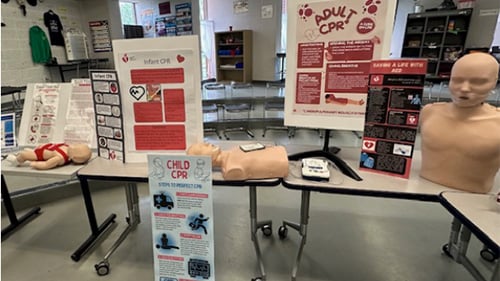Tips for Student-Lead Classes
We’ve heard of Project-Based Learning (PBLs), which allows students to mostly have independent leadership through a task or project and creative...
AP & Honors Mathematics
Explore Wiley titles to support both AP and Honors mathematics instruction.
Literacy Skills & Intensive Reading
Connections: Reading – Grades 6–12
Empower student success with a proven intensive reading program that develops strong reading skills in striving readers.
Drama, Speech & Debate
Basic Drama Projects 10th Edition
Build students’ confidence and competence with comprehensive, project-based theatre instruction.
Literature
Connections: Literature
Support learners as they study dynamic, relevant texts and bring the richness of diverse voices to students through literature.
Literature & Thought
Develop critical thinking, reading, and writing across literacy themes, genres, historical eras, and current events.
Language Arts
Vocabu-Lit® – Grades 6–12
Help students build word power using high-quality contemporary and classic literature, nonfiction, essays, and more.
Connections: Writing & Language
Help students develop grammar, usage, mechanics, vocabulary, spelling, and writing and editing skills.
Reading/English Language Arts
Measuring Up to the English Language Arts Standards
Incorporate standards-driven teaching strategies to complement your ELA curriculum.
English Language Learners
Measuring Up for English Language Learners
Incorporate research-based best practices for ELLs with an approach that includes a focus on language acquisition strategies.
Mathematics
Measuring Up to the Mathematics Standards
Incorporate standards-driven teaching strategies to complement your mathematics curriculum.
Foundations
Measuring Up Foundations
Help students master foundational math skills that are critical for students to find academic success.
Science
Measuring Up to the Next Generation Science Standards
Give students comprehensive NGSS coverage while targeting instruction and providing rigorous standards practice.
Assessment
Measuring Up Live
Deliver innovative assessment and practice technology designed to offer data-driven instructional support.
For a better website experience, please confirm you are in:
What the Earth signifies to me… We've covered that already. The Earth is suffering from pollution, and we must protect it! Been there, done that! Let's design Earth Day activities that offer a fresh perspective for our students!

Ever heard of the line: “How do I love thee? Let me count the ways…” by Elizabeth Barrett Browning? Have your students rewrite this sonnet to include Earthly metaphors, lists, lines, and specific reasons they love the Earth—nature, weather, animals, outdoor activities, etc.
How Do I Love Thee? (Sonnet 43)
How do I love thee? Let me count the ways.
I love thee to the depth and breadth and height
My soul can reach, when feeling out of sight
For the ends of being and ideal grace.
I love thee to the level of every day’s
Most quiet need, by sun and candle-light.
I love thee freely, as men strive for right.
I love thee purely, as they turn from praise.
I love thee with the passion put to use
In my old griefs, and with my childhood’s faith.
I love thee with a love I seemed to lose
With my lost saints. I love thee with the breath,
Smiles, tears, of all my life; and, if God choose,
I shall but love thee better after death.
You’ll need clear contact paper, access to the outdoors, and notecards. This activity is supposed to encourage interaction with nature. Students should then write creative clues to help their classmates guess which suncatcher is theirs just by describing it.
Video Requirements
Make sure students know who their state representatives are. If not, have them use a search engine to find out who they are and how to contact them.
Tips for writing representatives:
What are students doing to help or hurt the Earth? Have students use a Venn Diagram with two sides that read:

We’ve heard of Project-Based Learning (PBLs), which allows students to mostly have independent leadership through a task or project and creative...

Imagine your classroom transformed into a gallery, a science exposition, or a stoyy-telling stage, where students proudly display their work while...

We’re celebrating Earth Day (April 22) a little early this year by dedicating the month of April to some of our favorite books that bring the...

“The December spiral … prevents us from seeing the slow, meaningful gains our students are actually making.”

ELPs provide them with a fun learning environment and create a sense of belonging. These learning programs are also a productive way to support...
.jpg)
Congratulations! You’re well into the first semester now. You’re developing new and solid relationships with your learners and creating a classroom...

The summer break is winding down, and soon you'll be setting up your classroom for another year of learning adventures. Whether you're a first-year...

Here’s my one caveat, if you’re bothered by a lot and expect quiet student perfection, this might not be the classroom management plan for you. But...

The days leading up to winter break can feel like a countdown clock ticking louder by the minute. Attention spans shrink, energy levels spike, and...

Educational studies have proven time and time again that learning loss is a real phenomenon.

I don’t know about you, but I hate grading reading comprehension questions. First of all, the answers usually could be “borrowed” from websites like...

Discover how simulations can enhance learning in AP® U.S. Government and Politics. Engage students with hands-on activities like discretionary...

